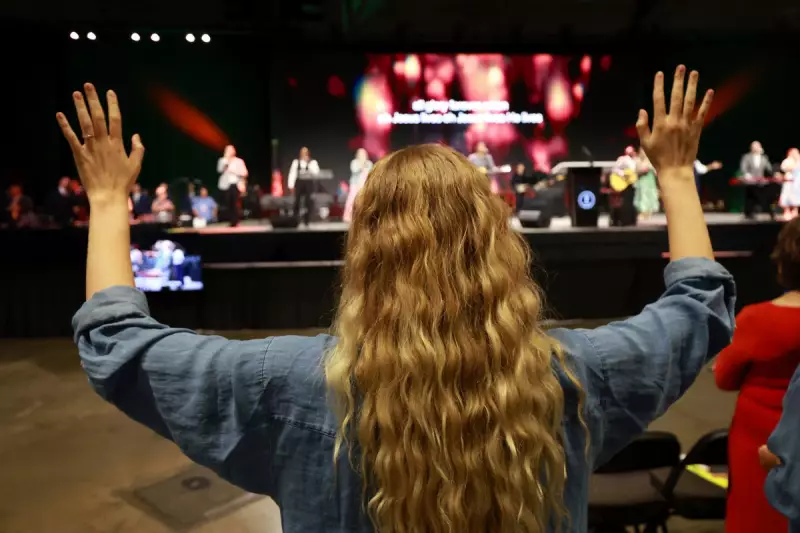
While the American feminist movement confronts significant challenges to gender equality during President Donald Trump's second term, an unexpected development is emerging from within traditionally male-led religious communities.
The Trump administration's dismantling of nondiscrimination programs and removal of high-ranking women from military positions represents notable setbacks for women's rights. Yet simultaneously, women from conservative faith backgrounds are increasingly asserting their influence in political and social debates.
Conservative Christian Women Mobilise
In a striking contrast to their faiths' maintained prohibitions against women serving as priests or senior pastors, outspoken women from Catholic and evangelical traditions are engaging with remarkable energy in public discourse. Many consider these ministry barriers separate from their capacity for political action.
The scale of this mobilization became evident when over 6,500 conservative Christian women gathered at an October conference in a Dallas suburb organised by commentator Allie Beth Stuckey. Her rallying cry—"Welcome to the fight"—signalled a new chapter in conservative women's political engagement.
Stuckey, referencing the assassination of conservative activist Charlie Kirk, reported being inundated with messages from Christian women declaring they were "done sitting on the sidelines of politics and culture." She firmly stated: "We're not backing down; we're doubling down. We're unapologetically saying no to the lies of feminism and progressivism and yes to God's Word."
Catholic Sisters Champion Social Justice
Within American Catholicism, religious sisters are demonstrating a different form of activism through social-justice advocacy. The Sisters of Charity of New York, an order established in 1809, made headlines in September with their public rebuke of Cardinal Timothy Dolan after he praised Charlie Kirk as "a modern-day St. Paul."
The sisters condemned Kirk's record, noting his rhetoric included "racist, homophobic, transphobic, and anti-immigrant" language alongside "violent pro-gun advocacy and promotion of Christian nationalism." They reaffirmed their commitment to "walk with all people who are poor and marginalized, to welcome immigrants and refugees, to defend the dignity of LGBTQ+ persons, and to labor for peace."
Another prominent figure, Sister Norma Pimentel of the Missionaries of Jesus, has become a leading migrant-rights activist along the U.S.-Mexico border. Running Catholic Charities of the Rio Grande Valley, she recalled a poignant moment when Border Patrol agents thanked her for helping them recognise migrants' humanity.
Evangelical Women Navigate Complementarianism
The Southern Baptist Convention, America's second-largest denomination, maintains doctrine supporting traditional gender roles both at home and in church leadership. This includes barring women from pastoral positions, a stance that has prompted the ousting of non-compliant churches.
Susie Hawkins, a Texas-based Bible teacher, clarifies that this complementarian framework doesn't equate to male domination. "The women I know have the freedom to speak their mind to their husbands, and to work through problems with them, within certain boundaries," she explained.
Hawkins pointed to Erika Kirk, widow of Charlie Kirk and now heading Turning Point USA, as exemplifying the satisfaction many evangelical women find in their roles. "She exemplifies a Christian wife and mom who is not ashamed of her love for her husband and her desire to serve him," Hawkins observed.
Allie Beth Stuckey recently addressed women's roles on her "Relatable" podcast, reiterating her belief that women shouldn't serve as pastors while asserting: "A gentle and quiet spirit... does not mean silence. Women are also called to raise a voice and to be a bastion of clarity and courage."
First Baptist Church of Dallas recently celebrated this perspective by honouring 13 women for their accepted ministries. Pastor Robert Jeffress explained: "Instead of focusing on the one ministry women are prohibited from doing, we wanted to recognise all the things women can do in the church."
Persistent Advocacy for Women's Ordination
Despite these developments, longstanding boundaries remain firmly in place within both major traditions. Pope Leo XIV, the first American pope, has shown no interest in advocating for women to serve as deacons or priests.
Yet women continue to hold significant administrative positions at the Vatican and within American Catholic institutions. Susan Timoney of The Catholic University of America notes that focusing solely on priesthood misses the broader picture: "The primary mission of the church—it's education, health care, social service agencies."
The Women's Ordination Conference, marking its 50th anniversary, continues its campaign despite the challenging climate. Executive director Kate McElwee describes her organisation as functioning like a "Ministry of Irritation" and finds encouragement in growing polarization: "As things get more polarized, we're seeing more people find their courage."
Fordham University theology professor Natalia Imperatori-Lee, while disheartened by the "serious backlash to gains women and minorities have made," finds hope in student activism. "Even if the headlines about our cultural backsliding are true," she noted, "the on-the-ground activism among young people shows they're up to the task."





